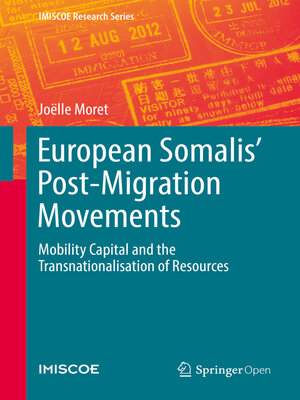European Somalis' Post-Migration Movements
ebook ∣ Mobility Capital and the Transnationalisation of Resources · IMISCOE Research Series
By Joëlle Moret

Sign up to save your library
With an OverDrive account, you can save your favorite libraries for at-a-glance information about availability. Find out more about OverDrive accounts.
Find this title in Libby, the library reading app by OverDrive.



Search for a digital library with this title
Title found at these libraries:
| Library Name | Distance |
|---|---|
| Loading... |
Based on a qualitative study on migrants of Somali origin who have settled in Europe for at least a decade, this open access book offers a ground-breaking exploration of the idea of mobility, both empirically and theoretically. It draws a comprehensive typology of the varied "post-migration mobility practices" developed by these migrants from their country of residence after having settled there. It argues that cross-border mobility may, under certain conditions, become a form of capital that can be employed to pursue advantages in transnational social fields. Anchored in rich empirical data, the book constitutes an innovative and successful attempt at theoretically linking the emerging field of "mobilities studies" with studies of migration, transnationalism and integration. It emphasises how the ability to be mobile may become a significant marker of social differentiation, alongside other social hierarchies. The "mobility capital" accumulated by some migrants is the cornerstone of strategies intended to negotiate inconsistent social positions in transnational social fields, challenging sedentarist and state-centred visions of social inequality. The migrants in the study are able to diversify the geographic and social fields in which they accumulate and circulate resources, and to benefit from this circulation by reinvesting them where they can best be valorised.The study sheds a different light on migrants who are often considered passive or problematic migrants/refugees in Europe, and demonstrates that mobility capital is not the prerogative of highly qualified elites: less privileged migrants also circulate in a globalised world, benefiting from being embedded in transnational social fields and from mobility practices over which they have gained some control.







